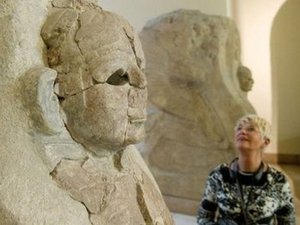Germany Agrees to Return Treasured Sphinx to Turkey

Germany Friday agreed to return a 3,500-year-old statue of a sphinx to Turkey where it was dug up, ending a war of words between Berlin and Ankara.
"Following talks between German and Turkish experts on the question of the Hittite sphinx it was agreed today in Berlin that the statue, which is currently housed in at the Pergamon museum, would be returned as a voluntary gesture of German-Turkish goodwill to Turkey," the culture ministry said in a statement.
"Both sides agreed that in the case of the Sphinx this is an isolated case which cannot be compared with other cases," the statement added in an apparent attempt to fend off further requests for the return of antiquities taken from foreign lands.
German archaeologists uncovered the sculpture of a lion's body and a human head in the ruins of the ancient Hittite capital Hattusha in central Turkey in 1915 and took it, along with another sphinx, to Germany for restoration.
The second sphinx was long ago returned to Turkey, but the reconstructed one was included in the Pergamon museum's permanent collection.
Turkish Culture Minister Ertugrul Gunay earlier this year warned that if the sphinx were not returned by June he would ban Germans from several ongoing archaeological digs around Turkey.
The sphinx will be returned before the end of November, the German culture ministry said.
Germany is also embroiled in a row with Egypt, which has demanded the return of the 3,400-year-old bust of fabled beauty Nefertiti which currently has pride of place in the Neues (New) Museum in Berlin.
Cairo began to demand the restitution of the Pharaonic-era statue back in the 1930s, but successive German governments have insisted the piece was bought legally and that there are documents to prove it.
